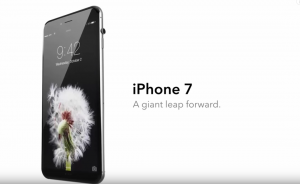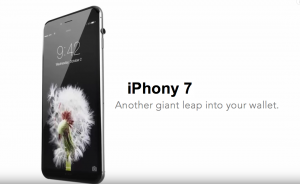CULTURE JAM ASSIGNMENT
by lina khairallah
ISSUE AT STAKE
The original iPhone 7 ad I chose is very simple and eye catching. The picture of the iPhone highlights its sleek exterior and exquisite finishing. The slogan “a giant leap forward” is very traditional of the way that Apple works. Each year they launch a new iPhone in attempts to sell and weaken the older models by constantly adding new features and drawing on their latest innovations. They strategically evoke this sense of constant improvement as necessary, one that consumers should keep up with by ditching their older iPhones and “leap[ing]” towards. Consequently, the Ad Implies that not purchasing the iPhone would mean that you are behind on the revolutionary technological advancements. This is particularly significant in a time driven by technology, where current consumer culture is very insistent on purchasing new technologies and trying to stay up to date with the latest features and trends.
Aside from the desire to change is the notion of planned obsolescence, a business tactic practiced by Apple and other companies. There was once a time where a phone would last for years and years, whereas with iPhones we see that this is no longer the case. Iphones happen to die out rather quickly, due to the way that they are built, leading people to frequently having to update their phones every few years. With each yearly improvement and the jacking up of iPhone prices, they are forced into buying the later more expensive models. The two aspects of planned obsolescence and the increase of prices are very advantageous to Apple. Customers are always looking forward to their latest advances, and are eventually forced into upgrading their phones either by choice or by the untimely death of their device. This is rather problematic as it is just another example in which consumers are manipulated and taken advantage of by prevailing companies such as Apple. As a person who is not very dependent on my phone, I am constantly placed in the midst of having to purchase a new one every time my phone happens to abruptly malfunction.
ORIGINAL AD

RECONSTRUCTED ADVERTISEMENT

ABOUT MY RECONSTRUCTION
I found that many of the advertisements I came across played on the notion of sex sells, with no form of subtlety. However, I preferred to go for an Ad that I could really bring awareness to. An Ad that is not trying to draw attention to itself based on how absurd it is. Using the iPhone, I was able to give the ad a rather witty twist by changing both the iPhone 7 title and the slogan. I wanted to challenge the concept of the business itself and how this can be reiterated by subtly twisting their language. Changing these two elements helped to reiterate the problematic capitalistic practices of Apple. The change from ‘iPhone’ to ‘iPhony’ emphasizes the fraudulent practices that customers are buying into. These innovations that are costing them more the life span of their phone as well as their money.
The most significant culture jamming that has taken place would be the change in the slogan. The new slogan heavily articulates on the capitalistic motives of Apple to constantly make profit off its customers. Apple is yet again leaping into the wallets of customers that is further stressed by the word “another”. The slogan attempts to make customers recognize that they are spending large sums of their money on a product that will not last. The word ‘another’ further helps to support my notion that apple is continuously jacking their prices, and are constantly feeding into the wallets of their customers. With regards to technologies, people should be spending money on products that are worthy. Apple has the power to create quality and long-lasting phone, yes chooses not to, in order to get more people buying their products. My new Ad hoped to reveal how the company lacks to deliver a code of ethics with its customers. The company fails to show its loyalty in the way that it produces its iPhones, which “iPhony” attempts to reveal. The idea being that people are being scammed for their money for an intentionally not-so-great product.
Hi, this is a comment.
To get started with moderating, editing, and deleting comments, please visit the Comments screen in the dashboard.
Commenter avatars come from Gravatar.